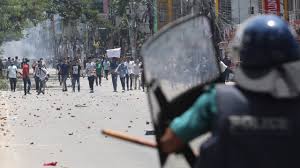
Bangladesh is engulfed in violent protests following the reinstatement of a controversial reservation policy for government jobs. The unrest has led to the deaths of 64 individuals and left over 2,500 injured, as reported by AFP. The clashes between students and security forces erupted after the High Court reinstated a policy reserving 30% of government jobs for the families of freedom fighters and veterans from the 1971 War of Independence.
The decision sparked immediate outrage among students and various groups, who argue that the reservation system is unfair and discriminatory. The protests have since escalated, culminating in the torching of the state broadcaster’s building a day after Prime Minister Sheikh Hasina’s appeal for peace.
In a televised address on Wednesday, Prime Minister Hasina urged for calm and patience, promising to review the policy. However, her reassurances did little to quell the anger of the demonstrators, who have been staging sit-ins, marches, and other forms of protest across the country.
The Supreme Court of Bangladesh has now intervened, suspending the High Court’s order. The government’s challenge to the reinstated reservation system is set for a hearing on August 7. This move aims to provide a temporary respite and prevent further violence, although tensions remain high.
The government’s handling of the situation has drawn criticism both domestically and internationally. Human rights organizations have called for restraint and a peaceful resolution to the crisis. The scenes of burning buildings and vehicles underscore the severity of the conflict and the deep divisions within Bangladeshi society over the issue of job reservations.
As the nation waits for the Supreme Court’s hearing, the hope is that dialogue and negotiation will replace the violence that has so far characterized the response to the High Court’s decision. The coming weeks will be crucial in determining whether Bangladesh can find a path to stability and fairness in its civil service hiring practices.
Sources By Agencies


